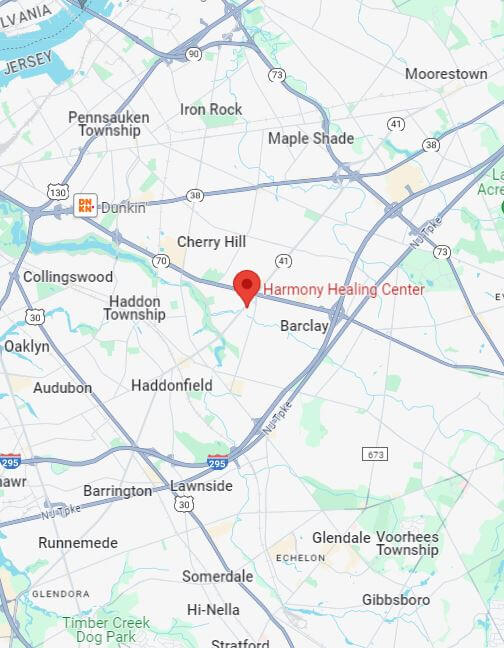Harmony Healing Center, centrally located in Cherry Hill, New Jersey, is known for its comprehensive alcohol addiction rehab and treatment. Our esteemed team of addiction treatment professionals is dedicated to guiding individuals along the path to recovery, helping them beat opioid addiction, including addiction to heroin, opiates, and prescription painkillers.
At Harmony Healing Substance Addiction Treatment Center, we recognize that each person’s journey to sobriety is as unique as they are. That’s why we take pride in offering customized rehab programs meticulously tailored to meet the diverse needs of our patients. Through personalized treatment plans, comprehensive assessments, and compassionate care, we empower individuals to navigate the complexities of addiction and start on a journey toward lasting recovery. Whether it’s detoxification, therapy, holistic interventions, or aftercare support, our holistic approach to addiction treatment ensures that every recovery process is tailored to patient needs. To learn more about Harmony Healing’s opioid addiction treatment programs, contact us online or call (888) 409-5356 to speak to a member of our admissions team.
What Is Opioid Use Disorder (OUD)?
Opioid use disorder (OUD) is marked by compulsive opioid use despite harmful consequences, impacting personal, social, and professional realms. It spans from prescription misuse to heroin addiction, with opioids binding to brain receptors, inducing euphoria and pain relief. Tolerance, dependence, and addiction often ensue from repeated use.
The diagnostic criteria for OUD include a cluster of symptoms such as craving opioids, experiencing withdrawal symptoms when opioids are not used, and continued use despite knowing the harm it causes. Additionally, individuals with OUD may exhibit behaviors such as spending a significant amount of time obtaining opioids, neglecting responsibilities in favor of drug use, and experiencing disruptions in relationships and employment.
Opioid addictions can be quite severe. There are some people who do rely on opioids to decrease their pain levels, so they can properly function in life. However, sometimes, even those people do become dependent on this drug. Over time, that dependency can lead to a drug addiction. There are others who buy opioids from people and abuse them right at the start. Either way, when an addiction forms, it can be tough to stop using the drug and create a life of recovery.
OUD is a chronic condition that requires comprehensive treatment, including medical interventions, behavioral therapy, and support services, to treat the physical and psychological aspects of addiction. Effective management of OUD involves a multifaceted approach aimed at promoting abstinence, improving overall well-being, and preventing relapse. If you want more information on opioid addiction treatment and our short-term programs or long-term treatment options at Harmony Healing Center, call our team or contact us online.
What Is an Opioid Addiction Treatment Facility?
An opioid addiction treatment facility offers specialized care for individuals battling an addiction to opioids, including heroin and prescription painkillers. Through tailored programs, including medication-assisted treatment (MAT) and behavioral therapies, these centers provide comprehensive support to address both physical withdrawal and psychological factors driving addiction, aiming to guide patients toward lasting recovery.
These facilities offer many services, including detoxification, individual and group therapy sessions, counseling, life skills training, and aftercare planning to support long-term recovery. The goal of an opioid addiction treatment facility is to provide a supportive and nurturing environment where individuals can safely detox from opioids, learn coping mechanisms to prevent relapse and develop the skills needed to lead healthy, fulfilling lives free from addiction. Statistics at the end of the article may highlight success rates, patient outcomes, and the effectiveness of various treatment approaches offered by these facilities in combating the opioid epidemic. If you or someone you know needs New Jersey opioid addiction treatment, contact us at Harmony Healing Drug and Alcohol Addiction Treatment Center or call (888) 409-5356.
Opioid Addiction Treatment Center in South Jersey
Harmony Healing Center offers support to those battling opioid addiction. Our facility provides personalized treatment options, including partial hospitalization programs (PHP) with housing for intensive outpatient care (IOP) for flexible opioid addiction therapy. With round-the-clock support and care, we help individuals navigate recovery while fostering healing and growth.
At Harmony Healing Center in Cherry Hill, NJ, we integrate evidence-based practices such as medication-assisted treatment (MAT) alongside counseling and therapy to address both the physical and psychological aspects of addiction. Through our outpatient programs, individuals can seamlessly transition from intensive treatment to ongoing support, equipping them with the tools and strategies needed to maintain sobriety in the long term. With a commitment to care and individualized treatment, Harmony Healing Center helps guide individuals on their journey toward recovery and reclaiming a life free of opioid addiction. For more information, contact us online or call Harmony Healing Rehab Center at (888) 409-5356.

Harmony Health Center – Cherry Hill, New Jersey
401 Kings Highway South
Building #1 Tara Corporate Park
Cherry Hill, NJ 08034
How to Find an Opioid Addiction Treatment Center in New Jersey
Seeking help for opioid addiction is an essential step toward recovery, and finding the right rehab center can significantly impact your journey to sobriety. With careful research and consideration, you can find an opioid rehab center that meets your specific needs and supports your path to recovery.
From assessing your treatment needs to verifying accreditation and visiting facilities, these steps are designed to help you find the support you need to overcome opioid addiction and find lasting recovery.
Steps to Find a Rehab Facility
By following these steps and research, you can find opioid addiction treatment centers in New Jersey that meet your needs and offer the support necessary for your journey to recovery. At Harmony Healing Substance Addiction Treatment Center, we facilitate opioid addiction treatment to make sober living a reality for our patients. Contact us online to learn more or call a member of our opioid addiction treatment center staff at (888) 409-5356 to discuss treatment options further.
Opioid Addiction Treatment Rehab Programs in NJ
New Jersey’s opioid addiction treatment rehab programs offer substance use recovery care for patients with opioid use disorder (OUD). Partial hospitalization programs (PHP) provide intensive support, while intensive outpatient programs (IOP) offer flexibility. Medical Detox treatment facilities initiate recovery, and residential programs offer long-term support. Explore each program’s unique approaches to combat opioid addiction and facilitate healing in New Jersey.
NJ Partial Hospitalization Programs (PHP) for Opioid Addiction Treatment
NJ Intensive Outpatient Programs (IOP) for Opioid Addiction Treatment
NJ Detox Treatment for Opioid Addiction Treatment
NJ Residential Program for Opioid Addiction Treatment

Contact Us for a Free Assessment
Are you ready to turn the page and begin a new chapter in your story? We have the tools you need to transform your life. Let’s talk about what’s next.

Types of Opioid Addictions We Treat at Harmony Healing Center NJ
Harmony Healing Center NJ has a multitude of services that we use to help people overcome addictions. One of the addictions we treat is opioid addiction. However, not everyone is addicted to the same opioids. Some of the different types of opioid addictions we treat include:
If you have been abusing any of the opioids noted here or any other opioids, let our team know. We want to help you overcome the addiction. Our 24/7 hotline offers immediate support. We want to help you develop a strong foundation for your recovery so you can have the life you deserve.
Opioid Addiction Treatment Medication
Medication is vital in opioid addiction treatment, offering relief from withdrawal symptoms and cravings and supporting long-term recovery. Buprenorphine-Naloxone treatment, commonly known as Suboxone, is a medication used in medication-assisted treatment (MAT) to manage opioid dependence. Suboxone combines buprenorphine, a type of partial opioid agonist, with the medicine naloxone, an opioid antagonist.
This combination helps alleviate withdrawal symptoms while reducing the risk of misuse and overdose. Buprenorphine, also known by the brand name Subutex, is another treatment medication used in MAT for opioid addiction treatment. As a partial opioid agonist, Buprenorphine works to stimulate the opioid receptors in the human brain, as other opioids do, but to a lesser extent, thereby reducing cravings and withdrawal symptoms without giving the patient the same euphoric effects. Methadone, often prescribed under the brand name Methadose, is a long-acting opioid agonist used to manage opioid addiction. Methadone binds itself to opioid receptors in the brain like other opioids, effectively reducing cravings and withdrawal symptoms while eliminating the effects of other opioids. Naltrexone, marketed as Vivitrol, is an opioid antagonist medication used in opioid addiction treatment. Unlike opioid agonists or partial agonists, Naltrexone blocks opioid receptors in the brain while preventing the euphoric effects of opioids and reducing cravings. This medication is particularly beneficial for individuals who have completed detoxification and wish to maintain abstinence from opioids. When used in conjunction with addiction recovery programs and therapy, medication-assisted treatment offers a comprehensive approach to opioid addiction treatment, promoting long-term recovery and improving outcomes for individuals seeking to overcome opioid dependence.
Harmony Healing Substance Addiction Treatment Center offers medication-assisted treatment (MAT) to help patients battle their opioid addiction. To learn more about opioid addiction medication options at our center, contact us by calling (888) 409-5356.
Opioid Addiction Treatment Options
Depending on how severe your opioid addiction is, what your previous treatment history is and other factors, the treatments you need to help overcome that addiction may vary. However, no matter what the situation may be, our Harmony Healing Center NJ team is here to help develop a comprehensive treatment program that is filled with evidence-based treatments. Some of the opioid addiction treatment options we have in our treatment center:
In addition to these options, you can choose the type of treatment you want to enroll in. Some options you have for these programs include inpatient, outpatient, partial hospitalization and intensive outpatient. Our website has information on addiction rehab costs with or without insurance.
Does Health Insurance Cover Opioid Addiction Treatment Programs?
Health insurance plans typically cover addiction treatment services, including medication-assisted treatment (MAT), counseling, therapy, detoxification, and residential or outpatient rehab programs. Coverage varies based on factors like the treatment facility type, services offered, and network status. The Affordable Care Act ensures more inclusive coverage by mandating mental health and substance use disorder services as essential health benefits in marketplace plans.
At Harmony Healing Center’s recovery facility, we work with insurance providers to verify insurance coverage and determine the benefits available to individuals seeking treatment for opioid addiction. Individuals need to review their insurance policies carefully, understand their coverage options, and contact their insurance provider to inquire about coverage for addiction treatment services. Many recovery facilities also offer financial assistance programs or payment plans to help individuals access treatment despite having limited or no insurance.
By working closely with insurance providers and offering various payment options, Harmony Healing strives to help patients receive the recovery support and resources needed to overcome opioid addiction and gain lasting recovery. To learn more about your insurance coverage at Harmony Healing Center, complete an online insurance verification form or call us at (888) 409-5356.
What Health Insurance Companies Cover Opioid Addiction Treatment?
Major health insurance providers such as Aetna, Blue Cross Blue Shield, and Cigna offer coverage for opioid addiction rehab. BCBS plans across states often include services like detox, counseling, and residential rehabilitation. Aetna’s extensive network usually covers medication-assisted treatment, outpatient therapy, and inpatient rehab, while Cigna provides comprehensive coverage for MAT, therapy, and detox programs.
In addition to BCBS, Aetna health insurance, and Cigna, other major health insurance companies such as United Healthcare, Humana, and Anthem also offer coverage for opioid addiction rehab services. These providers often include addiction treatment as part of their mental health and addiction treatment coverage, ensuring they have access to the care they need to overcome opioid addiction. It’s essential to review their specific insurance plan details, including coverage limitations and network providers, to determine available coverage for addiction rehab services. To learn more about what your plan covers at Harmony Healing Center, complete an insurance verification form or call us.
How Much Do Opioid Addiction Treatment Programs Cost in Southern New Jersey without Insurance?
Opioid addiction treatment programs in Southern New Jersey without insurance vary in cost due to program type, duration, and amenities. Outpatient programs range from $3,000 to $10,000 for three months, while residential programs cost $10,000 to $30,000 for a 30-day stay. Detox services, priced between $500 and $2,000 per day, depend on the level of care.
It’s important to note that these figures are estimates, and actual costs can vary widely based on individual circumstances and the specific treatment center chosen. Some rehab facilities provide a sliding scale payment process or financial assistance to make treatment more affordable for those without insurance. Additionally, some nonprofit organizations and government-funded clinics may provide low-cost or free addiction treatment services to those in need. Therefore, individuals considering opioid rehab programs in Southern New Jersey without insurance should research different options, inquire about pricing, and explore available financial assistance options to find the most suitable and affordable treatment option for their needs. Contact us online at Harmony Healing Center to learn more about the available financing options for opioid addiction treatment.
Signs That Someone Has an Opioid Addiction
Recognizing the signs of opioid addiction is vital for early intervention and support. Opioid addiction, characterized by a compulsion to use opioids despite adverse consequences, can have profound effects on a person’s physical, emotional, and social well-being. Identifying these signs can help loved ones and professionals intervene and support recovery. Common signs of opioid addiction include:
- Increased Tolerance: Individuals may require higher doses of opioids over time to achieve the desired effects, indicating the development of tolerance.
- Withdrawal Symptoms: Experiencing symptoms of withdrawal when not using opioids, such as nausea, vomiting, sweating, tremors, and muscle aches, is a hallmark sign of opioid addiction.
- Preoccupation with Obtaining Opioids: Spending significant time and effort obtaining, using, and recovering from opioids, often at the expense of other responsibilities and activities, can indicate addiction.
- Social Withdrawal: Withdrawing from social activities, hobbies, and relationships previously enjoyed in favor of opioid use is a common sign of addiction.
- Changes in Behavior: Opioid addiction can lead to erratic behavior, mood swings, irritability, and secrecy surrounding drug use.
- Financial Problems: Financial difficulties, such as borrowing money, stealing, or selling belongings to support drug habits, may arise as individuals prioritize obtaining opioids over other needs.
- Physical Signs: Physical signs of opioid addiction may include pinpoint pupils, drowsiness, slurred speech, slowed breathing, and poor coordination.
- Neglect of Responsibilities: Neglecting work, school, or family responsibilities due to opioid use is a significant red flag.
- Continued Use Despite Negative Consequences: Despite experiencing very negative effects on physical health, personal relationships, and overall well-being, individuals with opioid addiction continue to use opioids compulsively.
- Denial and Defensiveness: Denial of addiction and defensiveness when confronted about drug use are common responses among individuals struggling with opioid addiction.
Recognizing these signs and symptoms of opioid addiction is the first step toward seeking help and initiating treatment. Addiction counseling and comprehensive treatment programs can provide individuals with the support, resources, and strategies needed to overcome opioid addiction. Here at Harmony Healing Center, we offer comprehensive treatment for patients who struggle with opioid addiction and withdrawal symptoms. Call our caring team at (888) 409-5356 if you need treatment or schedule a free assessment to begin the rehab admissions process.
Symptoms of Opioid Withdrawal
Opioid addiction symptoms occur when patients abruptly reduce or cease opioid use. These symptoms reflect the body’s adjustment to the absence of opioids due to physiological dependence developed through prolonged use. Severity varies based on opioid type, dosage, and individual differences. Recognizing these symptoms is crucial for offering proper care and support during this challenging phase.
Common symptoms of opioid withdrawal include:
- Flu-like Symptoms: Patients may experience flu-like symptoms such as muscle aches, joint pain, sweating, chills, and fever during opioid withdrawal.
- Gastrointestinal Distress: Gastrointestinal symptoms are prevalent during opioid withdrawal and may include nausea, vomiting, diarrhea, abdominal cramping, and loss of appetite.
- Agitation and Anxiety: Feelings of agitation, anxiety, restlessness, and irritability are common psychological symptoms of opioid withdrawal, reflecting the body’s heightened stress response during this period.
- Insomnia: A common withdrawal symptom, insomnia is difficulty falling asleep or staying asleep, contributing to feelings of fatigue and exhaustion during opioid withdrawal.
- Yawning and Runny Nose: Excessive yawning and a runny nose, often referred to as “cold turkey,” are classic signs of opioid withdrawal and may occur as the body attempts to regulate its functions without opioids.
- Dilated Pupils: Pupillary dilation, or enlarged pupils, is a physiological response to opioid withdrawal and may be observed during physical examination.
- Goosebumps and Skin Crawling Sensations: Skin sensations such as goosebumps, commonly referred to as “gooseflesh” or “skin crawling,” are frequent complaints during opioid withdrawal.
- Mood Swings and Depression: Mood swings, depression, and feelings of hopelessness or despair are common psychological symptoms experienced during opioid withdrawal, reflecting the neurochemical changes occurring in the brain.
- Increased Heart Rate and Blood Pressure: Opioid withdrawal can lead to physiological changes like increased heart rate and blood pressure, reflecting the body’s heightened state of arousal during this period.
- Cravings: Intense cravings for opioids are a hallmark symptom of withdrawal and may persist throughout the withdrawal process, contributing to the risk of relapse without appropriate support and intervention.
It’s important to note that opioid withdrawal symptoms can be highly distressing and challenging to manage without proper medical supervision and support. Seeking professional help from healthcare providers and addiction specialists can provide individuals with the guidance, resources, and treatments needed to navigate opioid withdrawal safely and effectively. Contact us at Harmony Healing Addiction Treatment Center in New Jersey for more information about how to start a personalized opioid addiction treatment plan.
Opioid Addiction Treatment Rehab Process
The opioid addiction treatment rehab process involves a personalized approach to treat the complex needs of individuals grappling with opioid dependence. When being treated in a New Jersey rehab for opioid addiction treatment, there are many programs offered to facilitate recovery and promote sobriety. The rehab process typically includes the following:

- Assessment and Evaluation: Upon admission, individuals undergo thorough assessments to evaluate their medical history, substance use patterns, mental health status, and treatment needs. This information guides the development of a personalized treatment plan tailored to their unique circumstances.
- Detoxification: For individuals with opioid dependence, detoxification is often the initial phase of treatment. Under medical supervision, detox programs help individuals safely manage withdrawal symptoms as opioids are cleared from their system. Medication may be administered to alleviate discomfort and cravings during this challenging period.
- Medication-Assisted Treatment (MAT): MAT is a cornerstone of opioid addiction treatment, particularly for individuals with severe dependence. Opioid addiction medication, such as methadone, buprenorphine, and naltrexone, are used with counseling and behavioral therapies to reduce cravings, prevent relapse, and support long-term recovery.
- Therapy and Counseling: Rehab programs offer various therapy modalities, including individual counseling, group therapy, and family counseling. These sessions help individuals explore underlying issues that contribute to their addiction, develop coping skills, and build a supportive network for ongoing recovery.
- Education and Skill-Building: Rehab programs often incorporate wellness education sessions to provide individuals with information about addiction, relapse prevention strategies, and life skills training. These sessions empower individuals to make informed decisions and navigate challenges they may encounter during their recovery journey.
- Aftercare Planning: As individuals progress through rehab, comprehensive aftercare planning is essential to support their transition into the community. Aftercare services may include continued therapy, a 12-step program, support group participation, vocational training, housing assistance, and ongoing medication management.
Through this holistic recovery approach, individuals in New Jersey rehab facilities for opioid addiction can access the support and resources needed to overcome addiction and rebuild their lives. By treating the physical, psychological, and social aspects of addiction, short-term and long-term rehab programs aim to empower individuals to achieve sustained sobriety and overall well-being. If you or someone you know needs opioid addiction treatment, call (888) 409-5356 to initiate the rehab admissions process.
New Jersey Opioid Addiction Free Assessments and Testing
Harmony Healing Center in New Jersey provides complimentary assessments and testing for those who struggle with opioid addiction. These evaluations offer insights into addiction severity, co-occurring mental health issues, and medical history, aiding in the creation of personalized treatment plans to address individual needs effectively.
At Harmony Healing Center, the goal of offering free assessments and testing is to remove barriers to treatment and ensure that individuals receive the support they need to overcome opioid addiction. By providing these services at no cost, Harmony Healing Center aims to empower individuals to take the first step toward recovery with confidence and reassurance. The compassionate and experienced staff at Harmony Healing Center guide individuals through the assessment process with sensitivity and professionalism, offering a supportive environment where individuals feel heard, understood, and supported on their journey towards lasting sobriety. Schedule a free substance use assessment online or call us at (888) 409-5356 to start the admissions process.
Admissions Process for Opioid Addiction Treatment Programs
The admissions process for opioid use disorder treatment programs is a critical step towards recovery and receiving support for overcoming addiction. Whether seeking treatment in New Jersey or elsewhere, understanding the admissions process can help individuals and their loved ones navigate the journey toward sobriety effectively. Typically, the admissions process for opioid use disorder treatment programs involves several key steps:
- Initial Assessment: The admissions process often begins with an initial assessment by healthcare professionals. This assessment may occur over the phone or in person and involves gathering information about the individual’s substance use history, medical and mental health status, treatment goals, and any specific needs or preferences.
- Verification of Insurance Coverage: Individuals seeking treatment may be asked to provide information about their health insurance coverage. Admissions staff will verify insurance benefits to determine coverage for treatment services, including detoxification, medication-assisted treatment, therapy, and aftercare.
- Clinical Evaluation: Following the initial assessment, individuals undergo a comprehensive clinical evaluation by medical and mental health professionals. This evaluation will help determine the level of care and treatment modalities needed to address the individual’s opioid use disorder effectively.
- Treatment Planning: Based on the clinical evaluation results, personalized treatment plans are created. These plans outline the recommended interventions, therapies, and services to support the individual’s recovery journey.
- Admission and Intake: Once the treatment plan is finalized and agreed upon, the individual is admitted to the treatment program. During the intake process, individuals may be asked to complete paperwork, provide medical history, undergo medical screenings, and familiarize themselves with the treatment facility’s rules and expectations.
- Orientation and Welcome: Upon admission, individuals receive an orientation to the treatment program, including an introduction to staff, a tour of the facility, and an overview of the daily schedule and program expectations. This helps individuals feel comfortable and informed as they begin their treatment journey.
By following these steps, individuals can access the support and resources needed to embark on their recovery journey from opioid use disorder. Admissions staff are available to guide individuals through each step of the process, ensuring a smooth transition into treatment and setting the stage for successful recovery. To start opioid addiction treatment, contact us at Harmony Healing Drug and Alcohol Addiction Treatment Center.
Get Opioid Addiction Treatment at Harmony Healing Center NJ Today
No matter what type of opioids you have been abusing or have become addicted to, our Harmony Healing Center NJ team can help create a treatment program that fits your needs. It begins with that first phone call and from there our team can assist you throughout the recovery process.
Contact us today to get opioid addiction treatment.
New Jersey Opioid Use Disorder Stats
Discover the Garden State and Its Famous Cities & Sites
Contact Harmony Healing Center
Get personalized help from an empathetic professional.
For Your Free Assessment Call:
